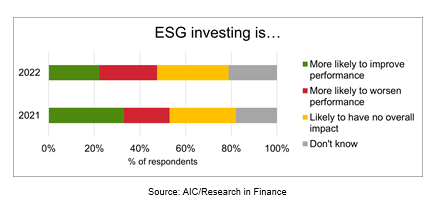- Three in five private investors still consider ESG
- Climate change investors’ top ESG issue in run-up to COP27
- Nuclear power should be part of the green energy mix, say 73% of investors
With the United Nations Climate Change Conference (COP27) due to begin on 6 November, private investors are more sceptical and pessimistic about ESG investing than they were a year ago, according to research1 from the Association of Investment Companies (AIC).
Three-fifths of investors (60%) still consider ESG when investing, though this is down from 65% in 20212.
However, of those who don’t consider ESG, 55% say they are not convinced by ESG claims from asset managers – double last year’s 27%.
Among all respondents, 58% are not convinced by ESG claims from funds, up from 48% last year, according to the survey of 402 private investors conducted by Research in Finance.
Investors more pessimistic about performance, risk and charges
There are marked changes from last year when it comes to investors’ expectations about the performance, risks and charges associated with ESG investing.
The share of respondents who think that ESG investing is more likely to improve performance has shrunk from 33% to 22%, with those expecting it to have a negative impact on returns increasing from 20% to 25%. This reflects the relatively poor performance of ESG equity funds in the first half of 20223.
Only 14% of respondents think ESG investing is likely be lower-risk than conventional investing, down from 20% last year, with 29% believing it will be higher-risk, up from 23%.
Nearly half (45%) of respondents think ESG investing is likely to lead to higher charges, with only 5% believing the opposite.
Richard Stone, Chief Executive of the Association of Investment Companies (AIC), said: “Our ESG research inevitably reflects the changed investment climate over the past 12 months, but it also carries an important message for the investment industry and for regulators. Trust is absolutely essential for ESG investing to grow and thrive. Investors need to have confidence in the claims made by investment products, and that in turn requires a clear and rigorous approach from the regulator – including, for example, robust and stringent requirements for a fund to be able to call itself sustainable.
“A majority of investors consider ESG when investing and over nine-tenths are looking to increase or maintain their allocation to sustainable investments. There is still appetite for investments that make a difference as well as making money, but funds’ ESG strategies and approaches need to be communicated clearly, factually and above all convincingly for investors to buy in.”
Relative importance of different ESG issues
Environmental issues (the ‘E’ of ESG) are regarded as most important by private investors. On a scale of 1 (not at all important) to 5 (extremely important), they received an average rating of 3.5. On the same scale, governance issues were rated 3.2 and social issues 3.1.
When respondents were asked which specific ESG issues were important to consider when investing, climate change topped the list with 60% finding it important4. Second most important was transparency and disclosure (56%), followed by pollution (55%), preventing waste (46%) and human rights (41%). Of these issues, pollution has seen the biggest jump in salience5 with the cleanliness of UK beaches having received increased media prominence this year.
Engage or divest?
A central debate in ESG investing is whether it is better to engage with companies, for example those with high carbon emissions, to try and influence them, or to divest from them in an attempt to starve them of capital.
Private investors are split on this issue. A majority (55%) think exclusion is not the answer and it is always better to engage with companies, but a third (33%) believe there are certain industries or activities that should simply be excluded from funds with an ESG/sustainable objective.
One investor commented: “I believe in giving people a chance but they need to show that they are making efforts to make changes… There is a step where you say enough is enough and then that stock should be sold.”
When asked about what investments they would fully exclude from their portfolios, investors are most likely to cite those that involve child labour (53%), pornography (43%), oppressive or controversial regimes (40%), firearms (34%), animal welfare violations (32%) and tobacco (32%). Only 13% of investors would fully exclude fossil fuels, though a further 36% would “try to avoid” investing in them.
One investor said: “I would certainly see what is in the top ten holdings because there are some things that I just wouldn't invest in. Some of those would be gambling companies and, to some extent, probably the big oil companies and the fossil fuel companies I would tend to avoid as well.”
There is widespread acceptance of nuclear power as a legitimate “green” investment. Nearly three-quarters (73%) of respondents agree that nuclear power should be part of the green energy mix, with 40% strongly agreeing. Only 10% disagree.
The impact of current events
There was widespread agreement among respondents that the cost of living crisis has made sustainability less of a focus this year, with 63% concurring with this statement.
However, the impact of other events was less clear-cut. The Russia-Ukraine war has made 22% of respondents more likely to invest in sustainable funds over the next 12 months, but it has made 18% less likely to do so. Market falls have had a similarly mixed effect, with 17% more likely to invest in sustainable funds, but 18% less likely. For most respondents, these issues have had little or no impact on their likelihood to invest in sustainable mandates.
Nearly two-fifths (37%) of investors are looking to invest more in sustainable investments over the next 12 months, with only 6% expecting to invest less.








